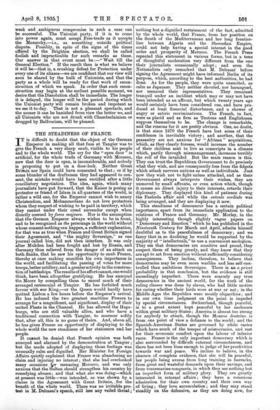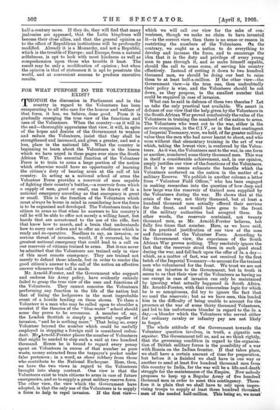THE STEADINESS OF FRANCE.
IT is difficult to doubt that the object of the German Emperor in making all that fuss at Tangier was to give the French a very sharp snub, visible to his people and. to the whole world. The cry for the "open door" is artificial, for the whole trade of Germany with Morocco, now that the door is open, is inconsiderable, and nobody is proposing to put on a door-lock. Neither Great Britain nor Spain could have consented to that ; or if by some blunder of the draftsmen they had appeared to con- sent, the mistake would have been rectified after a little conciliatory negotiation. The idea, again, which • many journalists have put forward, that the Kaiser is posing as protector or friend of Islam in all quarters of the world, is rather a wild one, for the. Emperor cannot wish to annoy Christendom, and. Mohammedans do not love protectors whom they suspect of wishing to be paid in territory, which they cannot under their creed surrender except when directly coerced by force ,majeure. Nor is the assumption that the German Emperor always wishes to be in,front, and. to be recognised as the personage in the world without whose consent nothing can .happen, a sufficient explanation, for that was as true when France and Great Britain signed their Agreement, and. "the mighty Sovereign," as one journal called him, did. not then interfere.. It was only after .Mukden. had , been fought. and. lost by Russia, and Germany thus relieved from the danger of an attack on both,flanks, that he saw his opportunity to snub France, thereby at once making manifest his own importance in the world, and. facilitating the passing of votes for more troops, better artillery, and a greater activity in the construe- tibn of battleships. The results of his effort cannot, one would think, have been altogether gratifying. He has annoyed the Moors by compelling them to cancel much of their arranged ceremonial at Tangier. He has forfeited. much favour with eur King,—or the Queen would, hardly have quitted Lisbon a few hours before the Emperor's arrival. He has induced the two greatest maritime Powers to arrange for a magnificent, and significant, display of their united Fleets in the Channel. He has allowed the Haps- burgs, who are still valuable allies, and who have a traditional connection with Tangier, to murmur softly that, after all, this is no game of theirs. And, above all, he has given France an opportunity of displaying to the whole world the new steadiness of her statesmen and her people. It.cannot .be, denied that French opinion was both annoyed and alarmed by . the .demonstration at Tangier ; but the mode adopted of displaying. those feelings was unusually calm and dignified. Her Minister, for Foreign Affairs quietly explained that France was abandoning no claim and injuring no interest.;, that she had overlooked many occasions., ter menacing Morocco, and_ was only anxious that the'SUltan,should strengthen his country by remedying abuses;, and that what she was doing—which at present was .little--was. intended, as was shown by, a clause in the Agreement with Great Britain, „for the benefit of the whole world., There was no irritable_ pro- teat in 111. Delcassi.'s speech, still less any veiled threat; nothing but a dignified restatement of the fact, admitted by the whole world, that France, from her position on the South of the Mediterranean and her long frontier- line between Algeria and the Shereefian Empire, could not help having a special interest in the good order and prosperity of Morocco. The French Press repeated. this statement in various forms, but in a tone of thoughtful moderation very different from the one their journalists occasionally adopt ; and even the Nationalists only remarked that M. Delcass6 before signing the Agreement might have informed Berlin of its purpose, which, according to the best authorities, he had done. As for the people, they were quite unexcited, as calm as Japanese. They neither shouted, nor harangued, nor menaced their representatives. They remained tranquil under an incident which may or may not have been intended as an affront, but which twenty years ago would certainly have, been considered. one, and have pro- duced at least financial disturbance, and "a shower of angry or satiric recriminations. The French, in fact, were as placid and as firm as Teutons and Englishmen suppose themselves to be. The change is remarkable, and the reasons for it are pretty obvious. One, no doubt, is that since 1870 the French have lost some of their confidence in inevitable victory; and another, that the peasantry are not anxious for " African " acquisitions, which, as they clearly foresee, would increase the number of their children sent to live as conscripts in a climate which, partly through mismanagement, increases terribly the roll of the invalided But the main reason is this. They can trust the Republican Government to do precisely what they wish, and are consequently free from the fidgets which attack nervous nations as well as individuals. Just now they wish not to fight unless attacked, and as their Government always interprets their wishes, they are unmoved by small affronts, or even action which, though it causes no direct injury to their interests, retards their diplomacy. They displayed this kind of patience during the Fashoda affair and while the entente cordiale was being arranged, and they are displaying it now.
This steadiness of demeanour has a certain political importance, apart from its immediate application to the relations of France and Germany. Mr. Morley, in the highly interesting though slightly vague papers on "Democracy and Reaction "which he has published in the Nineteenth. Century for March and April, admits himself doubtful as to the peacefulness of democracy ; and we fancy that in so doubting he would be supported by the majority of "intellectuals," to use a convenient neologism. They see that democracies are sensitive and proud, they suspect , them of being greedy, and they know that they are apt to act from emotion without sufficiently considering consequences. They incline, therefore, to believe that democracies may be even more warlike and less self-con- trolled than ambitious Sovereigns. There is an a priori probability in that conclusion, but the evidence is still exceedingly imperfect. There were scarcely any true democracies in the ancient world, for the work of the ruling classes was done by slaves, who had little motive for caring whether their lords were at war or not ; in the Middle Ages the .Republica were mostly oligarchies ; and in our own time judgment on the point is impeded by special circumstances. Switzerland, though peaceful, is to a great extent kept peaceful by her enclosure within great military States ; America is almost too strong for anybody to attack,, though the Monroe doctrine is from one point of view a defiance to the world; and the Spanish-American States are governed by white castes which,have much of the temper of aristocracies, and. rest for their:economic comfort upon the labour of inferior races. France is the only important democracy which is also surrounded. by difficult external circumstances, and. there has not been time enough to judge of her proclivities towards war and peace. . We incline to believe, in the absence. of ,complete evidence, that she will be peaceful, her people being averse from long training in barracks, from great and wasteful demands upon their -savings, and from transmarine conquests, in which they, see nothing but an imperfect form of military glory. They are greatly interested in, internal affairs ; they have a conscious admiration for their own country and their own way of living ; -they love accumulation ; a,nd they may stand steadily on the defensive, as they are doing now, for half-a-century more. If they do, they will find that many jealousies are appeased, that the Latin kingdoms will become their close allies, and that the general opinion as to the effect of Republican institutions will be profoundly modified. Already it is a Monarchy, and not a Republic, which is the trouble of Europe; and Europe, from a natural selfishness, is apt to look with most kindness as well as comprehension upon those who trouble it least. The result may be only a modification of opinion ; but when the opinion is that of statesmen it is apt to penetrate the world, and at convenient seasons to produce executive results.











































 Previous page
Previous page